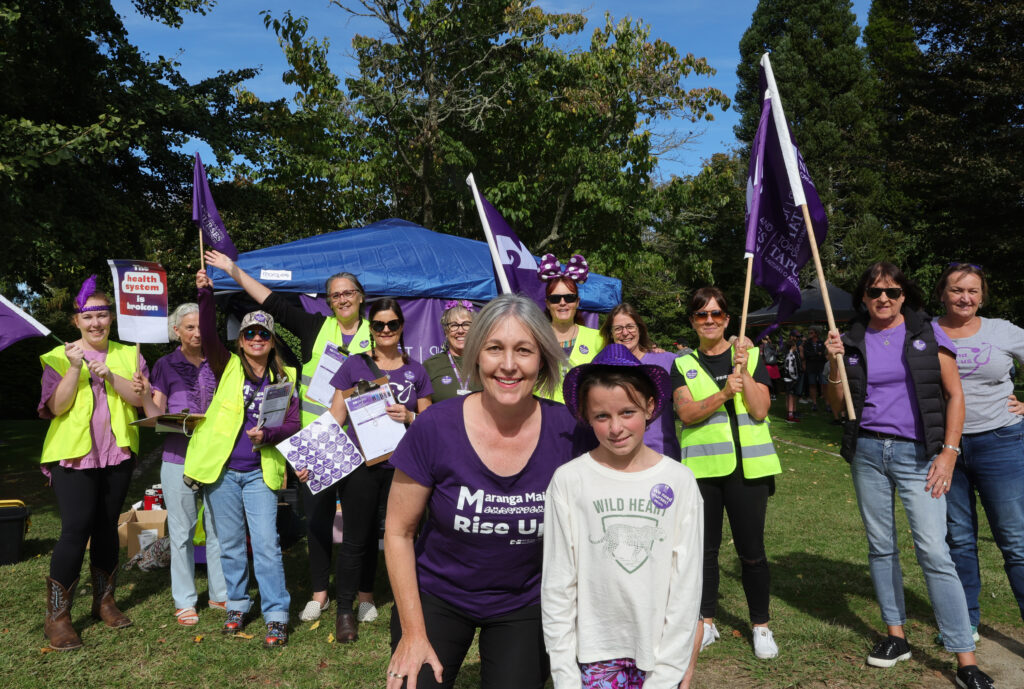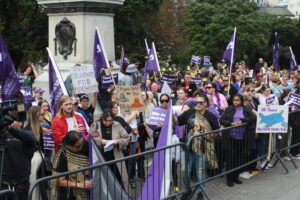Appropriate incentive payments and wellbeing measures for nurses who take on additional shifts to ensure patient care have been rejected by Te Whatu Ora in an offer to NZNO members for a new collective agreement.
The move has angered nurses, Hawkes Bay registered nurse and NZNO delegate Noreen Mccallan said.

“I can tell you that there is a level of fury that they are paying the doctors already and not even considering paying us.”
“They feel they are putting themselves through a traumatic, potentially unsafe, potentially harmful situation — to themselves and their patients — without any financial recognition for what they are doing.”
Tōpūtanga Tapuhi Kaitiaki o Aotearoa-NZNO has asked for an appropriate safety plan and payments for additional shifts and hours worked to be part of a collective agreement under negotiation.
But this has been rejected by Te Whatu Ora. An offer made in April did not include any mention of incentive payments, or wellbeing support.
This, despite a hospital system with over 3000 vacancies and members who say they are still traumatised by the extreme staffing shortages last winter.
Last year, Te Whatu Ora offered nurses incentive payments of $100 for additional eight-hour shifts worked, or $800 for five night shifts — in addition to usual overtime rates in the collective agreement, from July 1 to September 30.
“[Nurses] are talking about it now because it’s really bad, and they know in two months’ time it’s going to be drastically bad, that’s why they are very concerned about it.”
National director hospital and specialist services Fionnagh Dougan said no decision has been made “on whether winter payments will be made as part of Te Whatu Ora’s winter staffing arrangements”, in response to enquiries by Kaitiaki.
New Zealand Resident Doctor’s Association (NZRDA) has negotiated rates for its members who take on additional duties due to a lack of staff, of between $95-$220 per hour up to April 28.
The NZRDA was seeking to confirm these rates would apply to October, according to a post on social media.
Senior doctors are set to raise the issue of incentive pay for additional shifts, Association of Salaried Medical Specialists (ASMS) director Sarah Dalton said.

There were 27,435 requests made for additional nursing shifts under the winter payments scheme last year, according to information obtained through an Official Information Act (OIA) request.
Tairawhiti and Nelson-Marlborough regions were not able to retrieve or supply the data requested.
In September last year, Te Whatu Ora lead for people and culture Rosemary Clements told Kaitiaki the winter incentive payments would not be necessary beyond September 30.
“The payments were an extraordinary step in response to an extraordinary situation, namely excessive staff shortages due to COVID-19 illnesses . . .”

“We are pleased to see the need for additional hours is reducing significantly as COVID-19 and flu infections drop, and spring sees the weather start to improve.”
Data provided to Kaitiaki, after a complaint to the Ombudsman, showed the demand for additional shifts did not evaporate, as predicted.
In the week of October 3-8, (excluding Auckland, Hawke’s Bay, Bay of Plenty, Tairāwhiti, Nelson-Marlborough, Lakes, and Southern who did not provide the information) there was a total of 3022 unfilled shifts or staffing gaps in rosters.
Last Sunday, Stuff reported Waikato Hospital was short by 40 nurses across the facility, for one shift.
But delegate and registered nurse Janferie Dewar told Kaitiaki the situation was not uncommon, and on Monday the gaps had grown to 45 for the day shift.
‘I can tell you that there is a level of fury that they are paying the doctors already and not even considering paying us.’
“We’re not in winter yet. We did see this in winter last year, I know because I worked it and I still feel quite traumatised . . . We’re in autumn, what’s winter going to be like if we’ve got these sorts of deficits now,” she told Stuff.
Mccallan said winter, and related illnesses, had always increased pressure on health services — but it had just got a lot worse as a result of the crisis of short-staffing.

“[Nurses] are talking about it now because it’s really bad, and they know in two months’ time it’s going to be drastically bad, that’s why they are very concerned about it.”
Incentive payments made a practical difference for those who volunteered to pick up additional shifts, such as paying for childcare or take-aways and “at least it does make you feel valued”, Mccallan said.



